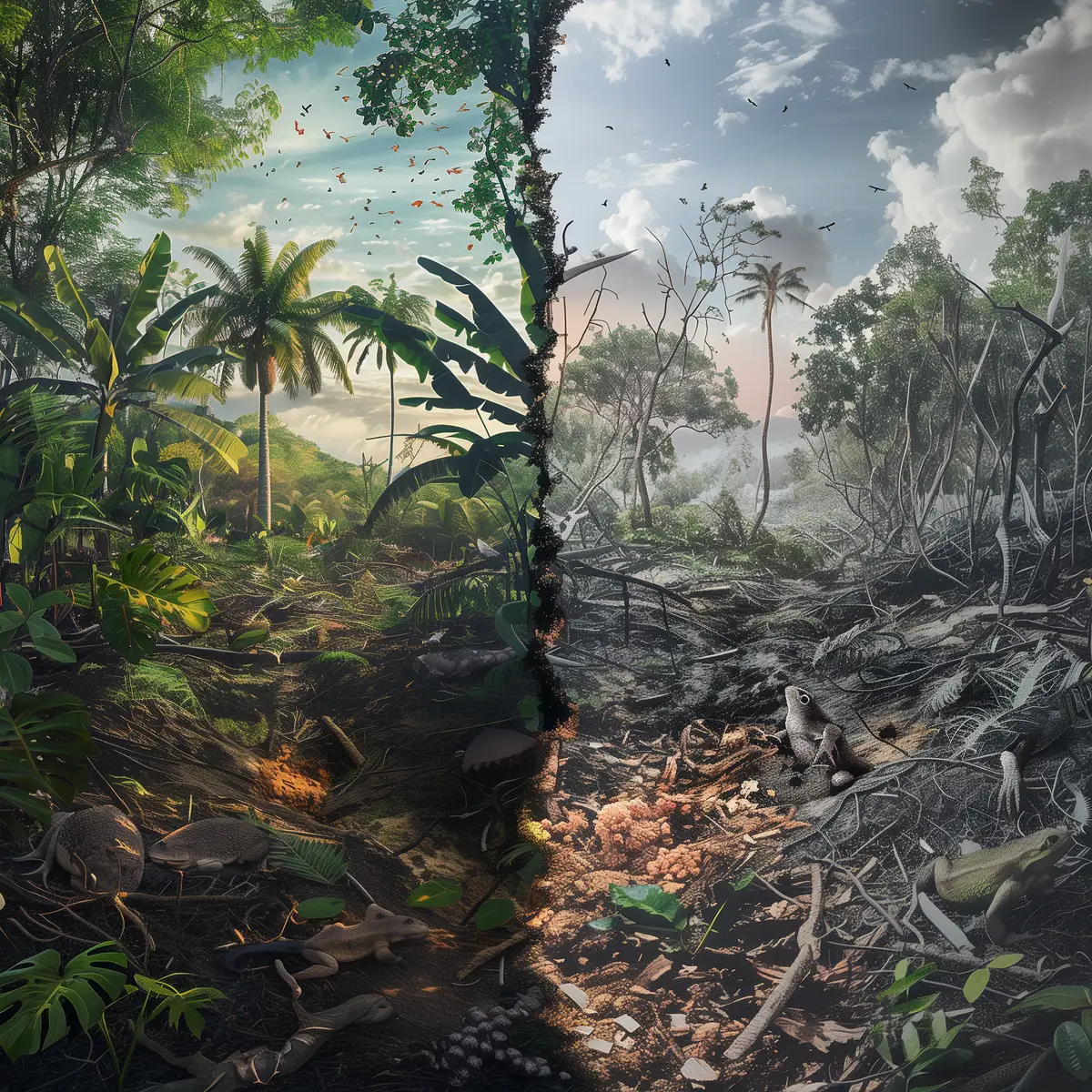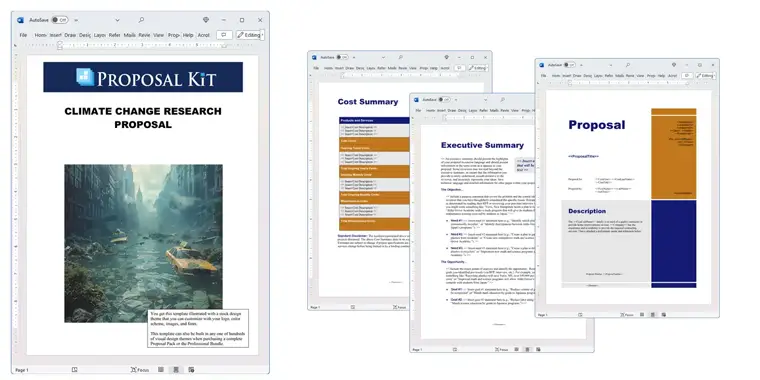How to write your Climate Change Research Proposal
We include this 16 page layout with every Proposal Pack. If you want this template to have a different visual design theme than the one illustrated here, purchase any Proposal Pack design and create this template using the purchased design theme. This template is included in every Proposal Pack. If you get a Proposal Pack or the Professional Bundle, you can also make any variation of this template with different chapters to suit your needs.
We typically include more chapters in the templates than most people will need to give everyone more variety in the chapters they may need. You can trim down a long template by removing pages you do not need or combining multiple chapter topics into one page.
 DOWNLOADABLE, ONE-TIME COST, NO SUBSCRIPTION FEES
DOWNLOADABLE, ONE-TIME COST, NO SUBSCRIPTION FEES If you need this template on DVD media order from our Amazon shop.
If you need this template on DVD media order from our Amazon shop.
You can also create countless variations of this document to suit your needs using the included library of 2200+ chapters if ordering a Proposal Pack or Pro Bundle.
 What Our Clients Say
What Our Clients SayI am a contractor for the United Way and this product makes the process of writing proposals much easier. I have to work with the Community Financial Stability Committee and we submit at least six proposals per year."
Small Business Risk Analyst
Related Article
Related Video
Related Templates
- Natural Resources Management Proposal
- Extinction and Climate Change Study
- Research Funding Request Proposal
- Population Migration Due to Climate Change Study
- Climate Change Natural Resources Replenishment Problems Report
- Bioremediation Environmental Services Proposal
- Research Expedition Grant Funding Request
- PhD Thesis Proposal
- Research Proposal (Short)
- International Research and Development Project Proposal
- Research Assistant Proposal
- Research Proposal (Long)
- Climate Change Causing Natural Resources Replenishment Problems Report
Writing a Climate Change Research Proposal with Proposal Kit
Do you need help writing a climate change research proposal and figuring out where to start? A proven way to approach this complex endeavor is by using the Proposal Kit. This tool simplifies the proposal writing process. Proposal Kit's software and template library offers a step-by-step guide to writing a detailed and persuasive proposal, ensuring you cover all necessary aspects of your research project.
We will explore how the Proposal Kit can assist you in writing a proposal on the effects of climate change on water redistribution and its impact on the environment and economy of a specific area. With the increase in global warming, understanding and mitigating its effects, such as environmental disasters and sea level rise, has become more critical than ever. The majority of people now favor climate change proposals.
Are you in a situation where you must write a climate change research project proposal? If so, Proposal Kit is your go-to resource.
What Types of Projects Are Climate Change Research Proposals Written For?
Climate change research projects are diverse, reflecting the broad impact of global warming on our planet. Examples of these projects include:
- Studying the impact of sea level rise on coastal communities.
- Analyzing the effects of changing precipitation patterns on agriculture.
- Researching the influence of temperature increases on ecosystems.
- Evaluating the economic impacts of climate change mitigation strategies.
- Investigating the social implications of environmental disaster displacement.
- Assessing the effectiveness of renewable energy sources in reducing carbon footprints.
- Monitoring air quality and its health impacts in urban areas.
- Exploring innovative water conservation techniques in response to changing weather patterns.
- Developing policies for sustainable land use to prevent habitat destruction.
- Conducting public awareness campaigns on the importance of reducing greenhouse gas emissions.
Chapters this template is built with
Proposal Kit offers a variety of chapter templates that can be seamlessly integrated into your climate change research proposal.
By thoroughly addressing these topics in your climate change research proposal, you demonstrate a deep understanding of the issue, the rigor of your research approach, and the potential impact of your findings, making a solid case for the support and funding of your project.
These templates, alongside the comprehensive line item quoting database for financial documentation, make Proposal Kit an invaluable tool for any research team.
Cover Letter
The cover letter is the gateway to your proposal, offering a snapshot of what's to come. It should introduce your team, briefly outline the project's objectives, its significance in climate change, and why your team is uniquely qualified to undertake this research. The tone should be engaging yet professional, compelling the reader to consider the importance of your work and its potential impact.
Justification
This section is where you make your case compellingly. Explain the urgency behind your research, underlining the specific aspects of climate change your project will address, such as the increasing frequency of extreme weather events or the urgent need for adaptive strategies in vulnerable ecosystems. Highlight the gap in current knowledge or policy your research aims to fill, clarifying why your project must be completed.
Economic Impact
Discuss the potential economic ramifications of climate change in your focus area and the outcomes of your research. This could include the cost of inaction, such as possible damage to infrastructure, losses in agriculture productivity, or the economic benefits of implementing your research findings, like job creation in sustainable industries or preserving valuable ecosystems. Quantify the impact where possible to strengthen your argument.
Methodology
Detail the scientific methods and approaches you will employ in your research, including data collection, analysis techniques, and any innovative tools or software you'll use. Describe how these methods will enable you to accurately assess the effects of climate change on your area of focus and how they align with the objectives of your project. Clarity and specificity are crucial here to build confidence in your research design.
Project Background
Provide context for your research by summarizing relevant existing studies, theories, and findings related to your project. This background should establish a foundation for your study, demonstrating your thorough understanding of the subject matter and how your project will contribute new knowledge or insights.
Affected Area
Describe the specific geographic area or community your research targets, detailing how climate change has impacted or is expected to impact this area. Include relevant data or studies to support your descriptions, such as changes in precipitation patterns, sea level rise, or increased extreme weather events.
Environmental Impact
Evaluate the potential environmental consequences of the issue you are researching and the implementation of your project's findings. Consider the direct and indirect effects on local ecosystems, biodiversity, and conservation efforts. Also, discuss any mitigation strategies you will incorporate to minimize negative impacts during your research process.
Time Line
Outline the projected timeline for your project from initiation to completion. Include critical milestones, such as data collection periods, analysis phases, and report drafting. A well-structured timeline demonstrates project feasibility and your team's ability to manage and execute the research within a set timeframe.
Climate Change
Discuss the broader implications of climate change related to your project, situating your research within the global context. This could include links to global warming trends, international climate policies, and the importance of your research in contributing to global efforts to mitigate climate change effects.
Entities Affected
Identify the stakeholders directly or indirectly impacted by your research outcomes, such as local communities, industries, policymakers, and conservation groups. Discuss how your research is relevant to each group and the potential benefits or changes they may experience due to your findings.
Recommendations
Based on your research findings, offer actionable recommendations for addressing the issues identified. These could range from policy changes and community action plans to suggestions for further research. Your recommendations should be practical, achievable, and linked to research outcomes.
Biography
Include brief biographies of your research team members, highlighting their expertise, previous research contributions, and specific roles in the project. This section adds credibility to your proposal by showcasing your team's qualifications and experiences.
Policy Changes
Propose specific policy changes or new policies needed for your research findings. Detail how these policies could effectively address the issues your project has highlighted, including the mechanisms for implementation and the expected benefits of such changes.
Use cases for this template
Elena's Story: The Research Scientist
Elena's journey began with a vision to explore how climate change alters water distribution patterns globally and its consequent effects on ecosystems and human populations. Aware of the competitive nature of research funding, she turned to Proposal Kit for a structured approach to proposal writing. By utilizing Proposal Kit's comprehensive templates, Elena could articulate the significance of her research, drawing attention to the urgent need for understanding water redistribution to address potential crises in water scarcity and flood risks preemptively.
The economic implications section of her proposal, bolstered by Proposal Kit's guidance, outlined the cost-effectiveness of early research and intervention compared to the financial toll of unmitigated climate change effects on agriculture, housing, and public health. Elena's methodological plan showcased a blend of traditional field research and cutting-edge technology, including satellite imagery analysis and predictive modeling, to track and forecast changes in water distribution.
Her success in securing funding was not just a testament to the quality of her research proposal but also highlighted the effectiveness of the Proposal Kit in organizing and presenting complex scientific inquiries compellingly. The funding enabled her to conduct crucial research that would contribute valuable insights to climate change studies.
Liam's Story: The Company Employee
Liam, tasked with a daunting deadline, faced the challenge head-on by leveraging Proposal Kit alongside an AI writing assistant. This synergy allowed him to produce a well-structured and detailed proposal efficiently. The challenge was not just the tight deadline but also the need to convey complex climate change research in a manner that was both accessible and convincing to stakeholders.
Proposal Kit's templates helped Liam structure his proposal, ensuring each section flowed logically into the next, from the background of climate change issues to the specific objectives and methodologies of GreenTech Solutions' proposed project. The AI writing tool complemented this by generating content for sections like the project background and methods based on Liam's prompts by analyzing GreenTech's existing resources and research goals.
This innovative approach impressed his superiors and demonstrated the power of combining traditional proposal writing tools with modern AI technologies. Liam's success story is a testament to the adaptability and efficiency that Proposal Kit can bring to any proposal writing process, especially under tight deadlines.
Maya's Story: The Non-Profit Volunteer
Maya's narrative stands out as a beacon of how individual initiative and the right tools can influence community-level decision-making on climate change. With no formal training in proposal writing, Maya utilized Proposal Kit to structure her ideas and research into a persuasive document. Her proposal aimed to highlight the interconnectedness of local environmental issues with global climate change trends and advocate for community-led initiatives to mitigate these impacts.
Through the Proposal Kit, Maya addressed the local concerns of the community she was representing, outlining the specific effects of climate change they were facing, such as increased flooding and drought periods. She then bridged these local issues to global environmental changes, emphasizing the importance of local action in the broader fight against climate change.
The proposal's clear structure and compelling narrative, enabled by the Proposal Kit, helped Maya convey the urgency of her community's situation and the practical steps they could take to make a difference. The success of her proposal in securing support and funding for her community's initiatives showcased the power of well-written proposals in driving meaningful action on climate change.
Conclusions and Recommendations
Writing a climate change research proposal can be complex but manageable with the Proposal Kit. Whether you are a seasoned researcher, a corporate employee, or a non-profit volunteer, Proposal Kit provides the tools and templates necessary to articulate your vision and secure funding.
Also Known As
This template may also be referred to in different ways or be used in more specialized situations, such as:
- Global Warming Mitigation Study Proposal
- Greenhouse Gas Emissions Research Project Plan
- Climate Resilience Enhancement Proposal
- Environmental Impact Assessment and Adaptation Plan
- Sustainable Development and Climate Research Proposal
- Carbon Reduction Strategies Initiative Proposal
- Climate Action and Sustainability Research Plan
- Renewable Energy and Climate Impact Study Proposal
- Atmospheric and Climate Dynamics Research Proposal
- Eco-innovation and Climate Adaptation Project Plan
Abstract
 Understanding how climate change affects both our environment and economy is crucial, especially with the global warming crisis at hand. Researchers need well-structured proposals to expand on this issue, and the Proposal Kit offers a comprehensive solution. This tool helps you create a robust plan to explore the ecological and economic impacts of climate change, including adaptation responses and priority areas. By conducting interviews and examining a full range of literature, researchers can address under-represented topics and disproportionately impacted regions in different countries.
Understanding how climate change affects both our environment and economy is crucial, especially with the global warming crisis at hand. Researchers need well-structured proposals to expand on this issue, and the Proposal Kit offers a comprehensive solution. This tool helps you create a robust plan to explore the ecological and economic impacts of climate change, including adaptation responses and priority areas. By conducting interviews and examining a full range of literature, researchers can address under-represented topics and disproportionately impacted regions in different countries.
The overarching goal is to develop a clear understanding of climate change impacts and propose actionable solutions. The first stage involves a thorough literature review to examine the extent of current knowledge and identify gaps. The Proposal Kit guides users through a proposed timeline, ensuring each milestone aligns with project goals. With a commitment to providing evidence-based recommendations, the Proposal Kit helps researchers present their work convincingly to secure necessary funds.
The Proposal Kit assists in identifying key criteria for inclusion in your research, emphasizing regional diversity and behavioral responses to climate change stressors. For example, examining the risk status of food security in vulnerable areas can highlight the need for new adaptive strategies. By detailing the economic impact of climate change, such as infrastructure costs or benefits from renewable energy programs, researchers can make a case for their work. The Proposal Kit's structured approach to methodology ensures clarity and efficacy, involving innovative technologies like predictive modeling. Researchers can also propose policy changes, supported by concrete data, to authorities and stakeholders. This comprehensive approach not only enhances the theoretical understanding of climate impacts but also provides practical solutions to mitigate future risks.
 The Proposal Kit is an invaluable resource for researchers aiming to tackle the pressing challenges posed by climate change. With a foundation built on a rigorous literature review, it helps identify priority areas where ecological responses to climate change need further examination. By facilitating the conduct of interviews and including a diverse range of regional studies, the Proposal Kit ensures that the diverse impacts across different countries are well-documented and analyzed. This inclusivity is crucial, as many regions remain under-represented in current research, even though they are disproportionately impacted by climate change.
The Proposal Kit is an invaluable resource for researchers aiming to tackle the pressing challenges posed by climate change. With a foundation built on a rigorous literature review, it helps identify priority areas where ecological responses to climate change need further examination. By facilitating the conduct of interviews and including a diverse range of regional studies, the Proposal Kit ensures that the diverse impacts across different countries are well-documented and analyzed. This inclusivity is crucial, as many regions remain under-represented in current research, even though they are disproportionately impacted by climate change.
The comprehensive methodology supported by the Proposal Kit allows researchers to develop robust adaptation responses. By examining the full range of climate change impacts - from changes in precipitation patterns and sea level rise to shifts in ecosystems - researchers can propose tailored solutions for each affected area. The proposed timeline ensures that each phase of the research is executed efficiently, maintaining a strong commitment to meeting deadlines and achieving the overarching goals.
In addition to detailing environmental impacts, the Proposal Kit addresses the economic implications of climate change. For instance, the potential cost of inaction, such as damage to infrastructure and agriculture, is weighed against the economic benefits of proactive measures like job creation in sustainable industries. This balance is crucial for convincing stakeholders of the importance of the research.
 The Proposal Kit also emphasizes the need for clear communication of findings.
The Proposal Kit also emphasizes the need for clear communication of findings.
By creating a summary of the research, researchers can convey the urgency and relevance of their work to policymakers, industries, and local communities involved. The ability to translate complex scientific data into actionable insights is a key benefit of using the Proposal Kit, ensuring that the research not only contributes to theoretical knowledge but also has a tangible impact on future climate policies and programs.
Through careful examination of ecological and behavioral responses, the Proposal Kit helps researchers address the criteria for successful climate adaptation strategies. By identifying areas at risk and developing tailored solutions, researchers can provide evidence-based recommendations that are both practical and feasible. This structured approach ensures that the research is not only of academic interest but also serves as an important tool for real-world applications, contributing to a more sustainable and resilient future.
Frequently Asked Questions
What should be included in introducing a climate change research proposal?
The introduction of a climate change research proposal should provide a clear and concise overview of the current state of climate change and its relevance. It should outline the specific problem or gap in knowledge that the proposal aims to address, justify the importance of the research, and set the context by citing relevant literature. The introduction should also state the research objectives and provide a brief overview of the methodology used to achieve these objectives, giving the reader a clear understanding of what to expect from the proposal.
How do I formulate research questions or hypotheses for my climate change proposal?
Research questions or hypotheses should be specific, focused, and researchable within the scope of your study. Start by identifying the key issues or gaps in existing knowledge related to climate change that you want to explore. Your questions should be clear and concise, avoiding overly broad or vague inquiries. If formulating hypotheses, ensure they are testable statements that can be supported or refuted through empirical research. Align these questions or hypotheses closely with your research objectives and ensure they address the core aims of your study.
What methodologies are appropriate for climate change research?
The choice of methodology depends on the specific research questions and objectives. Standard methodologies in climate change research include quantitative methods like statistical analysis, modeling, and simulations to predict climate patterns and impacts. Qualitative methods such as case studies, interviews, and surveys are valuable for understanding community responses and policy implications. Mixed-method approaches combining quantitative and qualitative techniques can provide a more comprehensive understanding. Justifying your chosen methods and explaining how they will address your research questions is crucial.
How do I ensure my research proposal is realistic and feasible?
To ensure your research proposal is realistic and feasible, clearly define the scope and limitations of your study. Consider the available resources, including time, budget, and access to necessary data or research sites. Outline a detailed timeline with specific milestones and deliverables. Identify potential challenges and propose contingency plans to address them. If needed, collaborate with experts or institutions to gain access to specialized equipment or knowledge. Ensuring your proposal is practical will increase its credibility and the likelihood of successful implementation.
How can I demonstrate the significance of my research?
Demonstrating the significance of your research involves clearly articulating how your study will contribute to the existing body of knowledge and its potential impact on policy, practice, or further research. Highlight the novelty of your approach or findings and explain how they address critical gaps in current understanding. Discuss the broader implications for climate mitigation, adaptation strategies, or societal benefits. Providing real-world applications or policy recommendations based on your expected findings underscores the practical importance of your research, making it more compelling to funders or stakeholders.
15% Off Discount
![]() Add To Cart This Word Template Only
Add To Cart This Word Template Only
 Add To Cart Proposal Pack for Any Business
Add To Cart Proposal Pack for Any Business
 Add To Cart Proposal Kit Professional Bundle
Add To Cart Proposal Kit Professional Bundle
 4.7 stars, based on 846 reviews
4.7 stars, based on 846 reviewsProposal Kit chapters used in this template
Cover Letter, Title Page, Table of Contents, Project Background, Climate Change, Justification, Methodology, Time Line, Environmental Impact, Economic Impact, Affected Area, Entities Affected, Policy Changes, Recommendations, Biography, Back Page
Included Calculator Spreadheets
These Excel calculator spreadsheets are included with this template. If you purchase a Proposal Pack or the Professional Bundle, these proposal pages are generated using an automated line-item database in the included Wizard software. The calculator spreadsheets are intended for use when purchasing only the static Word template.
You use this proposal for
- General business proposal
- Non-technical proposal
- Non-government grant, non-profit, NGO proposal
- Nature, environmental proposal
- Research, science proposal
How to create this template with Proposal Pack Wizard
You can create this document using any of the logo-designed Proposal Packs. Pick any Proposal Pack with a logo design theme you like best; they will all work equally well. The Proposal Pack for Any Business is the pack with no extra added logos or colors - designed to be used plain or for you to customize with your logos and graphics.
The Proposal Pack design theme you purchase will determine the visual look of this template. The screenshot above only shows the plain generic design theme. Names and stories in examples are fictional; however, the templates are from real client use cases.
We include a library of chapters to be assembled based on your needs. All proposals are different and have different needs and goals. We designed Proposal Pack so you can customize the documents to suit your needs.
You will best create this document using the Proposal Pack Wizard - Expert Edition software to select this template and build it in the Proposal Pack logo design theme of your choice along with any desired customizations (such as adding additional chapters, removing unneeded chapters, changing the order of chapters, and importing your company logo). This template outlines a proposal for the described situation. Each user is responsible for typing in the actual content of the provided pages with their information to complete the proposal. Suggestions in the abstract may include features in higher-end packages and are facilitated by the selection of chapter templates to support the narrative of each proposal, which help guide the user in filling in the details.
You create this template using the Wizard software with an entire Proposal Pack library and software. We include the Expert Edition of the software in the Proposal Kit Professional bundle. Microsoft Word for Windows is required to use the customizing software. You can also edit Word document templates in other office software such as Word for Mac. We will assist Mac users in assembling complex templates for their first project if they do not have the required platform to run the Wizard software.
You only get the single assembled Word document if purchased as a stand-alone template. The individual template products include no other templates, samples, or software.
How to Build Templates Featured on Proposal Kit Website
Many people find the Proposal Kit website after searching for a specific proposal. Once you've purchased and installed the software, how do you build that template you found in the first place? This video shows you how to build any proposal you see on the Proposal Kit website.
Key Takeaways
- The Climate Change Research Proposal is available as a ready-to-edit template.
- You can create unlimited custom variations of this template using a Proposal Pack or the Professional Bundle.
- Using a Proposal Pack or Professional Bundle, you can automate quotes and other financial pages with a line-item database.
- There are no ongoing subscription fees. You get lifetime unlimited use.
- We made Proposal Kit for freelancers, small businesses, and non-profits.
- Proposal Kit product content (templates, samples, software) is 100% written by humans.
 Ian Lauder has been helping businesses write their proposals and contracts for two decades. Ian is the owner and founder of Proposal Kit, one of the original sources of business proposal and contract software products started in 1997.
Ian Lauder has been helping businesses write their proposals and contracts for two decades. Ian is the owner and founder of Proposal Kit, one of the original sources of business proposal and contract software products started in 1997.By Ian Lauder
 Published by Proposal Kit, Inc.
Published by Proposal Kit, Inc.


 Cart
Cart


 Get 15% off ordering today:
Get 15% off ordering today: 

 Facebook
Facebook YouTube
YouTube X
X Search Site
Search Site